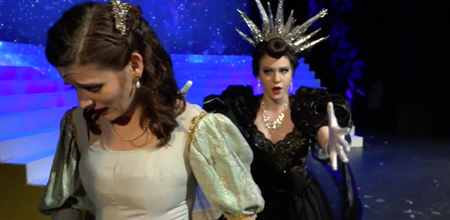Music Performance Degree: Vocal
Bachelor of Music (BMus)
Credits
133
Completion Time
4 Years
Delivery Method
Traditional, On Campus at Lancaster, PA
Why Study Vocal Performance at LBC?
In LBC’s vocal performance major, you’ll learn much more than just singing techniques. With classes focused on training you to be the best musical performer you can be, paired with a robust offering of Bible classes, you’ll graduate with a thorough knowledge of your craft – all based on the firm foundation of scripture.
We truly believe that God intends us to use our gifts to bring Him glory. We also believe that God can – and has – done incredible work in the hearts and minds of people through music. So why not study it? If singing is your passion, consider studying vocal music performance at Lancaster Bible College.
Course Length
16 weeks (semester)
Vocal Performance Program Cost & Financial Aid
Admissions Process
Where LBC Students Have Interned
- Opera Lancaster
- Sight & Sound Theatre
Accreditation
Lancaster Bible College is accredited by the National Association of Schools of Music (NASM).
Can I Transfer Credits?
Yes! Read about LBC’s transfer policy
Other Music Performance Studies Available
Music Performance: Vocal Program Scope
Bachelor of Music (BMus) (133 Credits)
Bible & Theology Courses 33 Credits
Arts & Sciences Courses 37 Credits
Music Courses 62 Credits
LBC 100 Foundations Seminar 1 Credit
Christian Service 0 Credit
View the Academic Catalog for the complete curriculum plan, course descriptions and complete program details.
What makes this LBC Vocal Performance program unique?
- Learn from world-class musicians, experienced performance coaches and professors – including current and former Broadway performers.
- Enjoy regular interaction with visiting performing artists from trendsetters and big names in the music industry while studying at an accredited Bible college in PA.
- Join a music performance major that has a record of consistent and high placement of LBC students in the National Association of Schools of Music competitions.
What are career paths with a Vocal Performance bachelor's degree?
The Vocal Performance program prepares students for a wide range of technical and/or ministry contexts. Here is a sampling of careers and opportunities this degree affords:
- Church Worship Leader
- Conductor
- Composer
- Performer
- Private Music Teacher/Instructor
- Soloist
- Songwriter
Vocal Performance Program Goals – In this program, students will…
- Demonstrate basic musicianship skills in sight-singing, dictation, conducting, voice and piano.
- Describe and demonstrate the integration of Biblical faith in life and career as artists.
- Apply historical and theoretical understanding to the analysis, performance, and creation of musical forms, processes, and structures found in representative examples from the western music tradition.
- Demonstrate professional skills on a primary instrument.
- Demonstrate a knowledge of the important composers and their works for a primary instrument.
Core Courses in the Vocal Performance Program
MUS 100 Music Fundamentals
MUL 100 Piano Fundamentals
MWP 102 Intro to Music, Worship, & the Performing Arts
MWP 400 MWPA Cross Cultural Externship
MUS 101 Music Theory I
MUS 101L Musicianship I Lab
MUS 102 Music Theory II
MUS 102L Musicianship II Lab
MUS 211 Introduction to Composition
MUS 211L Musicianship Lab III
MUS 301 Music Theory IV: Adv. Harmony
MUS 301L Musicianship Lab IV
MUS 330, 331, or 332
ENS 101 Chorale
ENS 132 Musical Theatre
ENS 201 Musical Theatre Workshop
ENS 202 Opera Workshop
MAP 100 MPWA Forum
MUL 101 Piano Lab I
MUL 102 Piano Lab II
MUS 221 Conducting I
MPD 305 Pedagogical Methods for Music Instruction
MPD 310 Vocal Pedagogy
MPR 399 Junior Recital
MPR 401 Performance Career Seminar
MPR 499 Senior Recital
MWP 301 Worship & Performing Arts Internship I
MWP 302 Worship & Performing Arts Internship II
MWP 450 Worship and Performing Arts Practicum
ENS Ensembles [4]
MAP 201 Applied Music – Voice [8]
MPR 301 Vocal Repertoire & Diction I
MPR 302 Vocal Repertoire & Diction II
MPD/MUS/MUE Elective
Admission Steps
for this Major
Audition for Acceptance into this Major
Every student who applies to any major in the Music, Worship & Performing Arts Department must audition for acceptance into the major of their interest and must also be accepted as a student to Lancaster Bible College.
